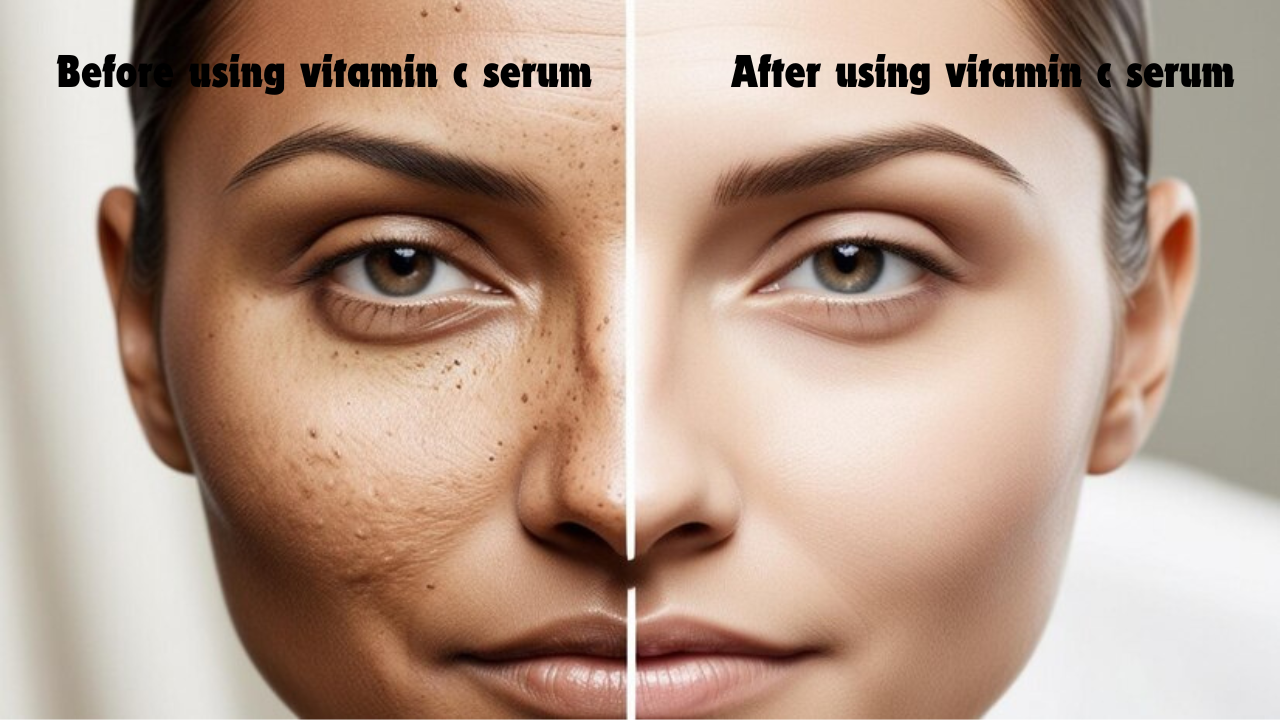Vitamin C serums are all the rage in skincare, and for a good reason. Whether you’re scrolling through skincare Instagram accounts or reading reviews online, you’ll often see jaw-dropping “before and after” photos showing remarkable changes in skin tone, texture, and clarity. But what makes Vitamin C serum so effective? This article breaks down everything you need to know, from how it works to what results you can expect from regular use.
Discover the transformative effects of Vitamin C serum before and after use. Learn how this powerful skincare ingredient brightens skin, reduces dark spots, and fights signs of aging with consistent application. Find out what results you can expect and how to use it for the best outcomes!
What Is Vitamin C Serum?

Understanding the Power of Vitamin C in Skincare
Vitamin C serum is a topical product rich in Vitamin C, a potent antioxidant that is essential for maintaining healthy, radiant skin. It helps protect your skin from environmental damage while promoting collagen production, which keeps your skin firm and youthful.
Why Vitamin C Is a Skincare Superstar
Vitamin C is a powerhouse ingredient because it fights oxidative stress, brightens the complexion, and evens out skin tone. It’s no wonder dermatologists and beauty experts recommend it as a must-have in your skincare routine.
How Does Vitamin C Serum Work?
The Science Behind Vitamin C’s Skin Benefits
When applied to the skin, Vitamin C neutralizes free radicals, which are unstable molecules that can cause premature aging. By blocking these free radicals, Vitamin C helps reduce the appearance of fine lines, wrinkles, and other signs of aging.
Antioxidant Protection Against Environmental Damage
Vitamin C is particularly effective in protecting your skin from the harmful effects of UV rays and pollution. Although it’s not a substitute for sunscreen, it can significantly boost your skin’s defense system.
Benefits of Using Vitamin C Serum
Brightening Your Skin Tone
If dull skin is your concern, Vitamin C serum can help. It enhances radiance by inhibiting melanin production, which causes dark spots and uneven skin tone.
Reducing Hyperpigmentation
Over time, Vitamin C fades dark spots and sun damage, giving you a more uniform complexion. This makes it particularly useful for those dealing with melasma or post-inflammatory hyperpigmentation from acne.
Fading Acne Scars
Vitamin C serum promotes cell turnover, which speeds up the healing process of acne scars. Its anti-inflammatory properties also help calm active breakouts.
Improving Skin Elasticity and Firmness
Collagen production decreases as we age, leading to sagging skin. Vitamin C boosts collagen synthesis, which keeps your skin plump and firm.
Vitamin C Serum Before and After: What to Expect
Week 1: Immediate Hydration and Brightness
In the first week, you’ll notice your skin feels more hydrated and looks brighter. Vitamin C serum helps to lock in moisture, giving your face a dewy glow.
Week 2-3: Smoother Texture and Reduced Redness
By weeks two and three, your skin’s texture should feel smoother. Redness and inflammation may also decrease, especially if you’ve been struggling with acne or irritation.
Week 4-6: Noticeable Reduction in Dark Spots and Fine Lines
After a month of consistent use, you should start seeing a significant reduction in dark spots, sun damage, and fine lines. Your complexion will appear more even and youthful.
Long-Term Use: Firmer, Youthful Skin
With long-term use, Vitamin C Serum Before and After helps maintain a firm and radiant complexion. Skin appears more youthful, with fewer wrinkles and improved elasticity.
How to Use Vitamin C Serum for Best Results
Step-by-Step Guide to Incorporating Vitamin C in Your Routine
To maximize the benefits of Vitamin C Serum Before and After , it’s crucial to use it correctly.
When to Apply Vitamin C Serum
Vitamin C Serum Before and After should be applied in the morning, after cleansing and before moisturizing. It pairs well with sunscreen for added protection against UV damage.
How Much Vitamin C Serum to Use
A pea-sized amount is enough to cover your entire face. Gently pat it into your skin, and wait for it to absorb before applying other products.
Common Mistakes to Avoid
Avoid applying Vitamin C Serum Before and After to damp skin, as it can cause irritation. Always layer it with sunscreen to prevent oxidation, which reduces its effectiveness.
Choosing the Right Vitamin C Serum
Key Ingredients to Look For
When selecting a Vitamin C serum, look for products that contain at least 10-20% L-Ascorbic Acid, the most potent form of Vitamin C.
L-Ascorbic Acid vs. Other Forms of Vitamin C
L-Ascorbic Acid is the gold standard, but other forms like Sodium Ascorbyl Phosphate or Magnesium Ascorbyl Phosphate are more stable and gentler on sensitive skin.
Additional Ingredients for Boosted Effectiveness
Many Vitamin C Serum Before and After also contain hyaluronic acid for hydration or ferulic acid to stabilize the formula and enhance absorption.
Potential Side Effects and How to Avoid Them
Common Skin Reactions to Vitamin C
Some people may experience mild irritation, redness, or dryness when first using Vitamin C serum. These symptoms usually subside as your skin adjusts.
What to Do If You Experience Irritation
If you notice irritation, start by using the serum every other day and gradually increase frequency as your skin builds tolerance.
Who Should Use Vitamin C Serum?
Ideal Skin Types and Concerns Addressed
Vitamin C serum is suitable for most skin types, especially if you’re concerned with dullness, uneven skin tone, or signs of aging.
Can Sensitive Skin Handle Vitamin C Serum?
If you have sensitive skin, opt for a serum with a lower concentration of Vitamin C (around 10%) to minimize the risk of irritation.
DIY Vitamin C Serum: Should You Try It?
Pros and Cons of Homemade Vitamin C Serums
DIY Vitamin C Serum Before and After can be more affordable, but they’re often unstable and less effective. It’s usually best to invest in a well-formulated commercial product.
Vitamin C Serum vs. Other Skincare Treatments
How It Compares to Retinol, Niacinamide, and Hyaluronic Acid
While Vitamin C Serum Before and After focuses on brightening and protection, retinol targets cell turnover, niacinamide reduces oil production,Vitamin C Serum Before and After and hyaluronic acid deeply hydrates. These ingredients complement each other but serve different purposes.
What to Expect After Stopping Vitamin C Serum
Does Your Skin Revert to Its Original State?
If you stop using Vitamin C Serum Before and After , your skin may gradually return to its pre-treatment state, losing some of the brightness and firmness gained from consistent use.
Conclusion
Vitamin C Serum Before and After is a versatile and powerful Vitamin C Serum Before and After addition to any skincare routine. Whether you’re looking to brighten your complexion, reduce dark spots, or fight early signs of aging, the “before and after” results speak for themselves. With consistent use, you’ll enjoy smoother, more radiant skin that’s protected against the elements.
FAQs
How long does it take to see results with Vitamin C serum?
Most people start noticing brighter, smoother skin after 2-4 weeks of consistent use.
Can I use Vitamin C serum at night?
Yes, but it’s typically recommended to use it in the morning to take advantage of its protective properties.
Will Vitamin C serum help with wrinkles?
Yes, Vitamin C boosts collagen production, which can reduce the appearance of fine lines and wrinkles.
Is Vitamin C serum safe for pregnancy?
Most Vitamin C serums are considered safe during pregnancy, but it’s always best to consult with your doctor first.
How do I store Vitamin C serum to keep it potent?
Store your Vitamin C Serum Before and After in a cool, dark place to prevent oxidation. Many serums come in dark glass bottles to protect them from light exposure.











